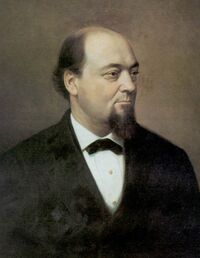George W. McCrary
| George Washington McCrary | |||
|---|---|---|---|
| |||
| Former Judge of the United States Court of Appeals for the 8th Circuit From: December 9, 1879 – March 18, 1884 | |||
| Predecessor | John F. Dillon | ||
| Successor | David J. Brewer | ||
| 33rd United States Secretary of War From: March 12, 1877 – December 9, 1879 | |||
| President | Rutherford B. Hayes | ||
| Predecessor | J. Donald Cameron | ||
| Successor | Alexander Ramsey | ||
| Former U.S. Representative from Iowa's 1st Congressional District From: March 4, 1869 – March 3, 1877 | |||
| Predecessor | James F. Wilson | ||
| Successor | Joseph C. Stone | ||
| Former State Senator from Iowa's 1st District From: January 13, 1862 – January 7, 1866 | |||
| Predecessor | ??? | ||
| Successor | ??? | ||
| Former State Representative from Iowa's 55th District From: January 1, 1858 – January 8, 1860 | |||
| Predecessor | ??? | ||
| Successor | ??? | ||
| Information | |||
| Party | Republican | ||
| Spouse(s) | Helen A. Gelatt | ||
| Religion | Unitarian[1][2] | ||
George Washington McCrary (August 29, 1835 – June 23, 1890) was a Republican from Iowa who represented the state's 1st congressional district for four terms, subsequently serving as Secretary of War under the presidency of Rutherford B. Hayes. McCrary was also appointed by Hayes to become a judge on a federal circuit court.
Contents
Background
McCrary was born near Evansville, Indiana to James McCrary and the former Matilda Forrest as one of seven children. The family moved to Van Buren County, Iowa in 1837 when it was only a territory,[2] where McCrary worked on a farm,[2] attended rural public schools and proceeded to start studying law in 1854.[3] After admission to the state bar in 1856, he commenced practice.
When preparing to become a lawyer, McCrary studied with future state legislator Henry Clay "H. C." Traverse.[4]
Political career
McCrary joined the newly established Republican Party in the 1850s, with which he remained affiliated with for the rest of his life.[2] In the 1856 presidential election, he voted for party nominee John C. Fremont.
In 1857, McCrary was elected to the lower body of the Iowa legislature, where he served for a term.[1] He later ran for state Senate from the 1st district, where he was elected twice. While young, McCrary was described as an "able and influential legislator."[1]
U.S. House of Representatives
In 1868, McCrary sought a U.S. House seat from Iowa's 1st congressional district to succeed Radical Republican James F. Wilson. He faced Democrat T. W. Clagett in the general election, and easily won by a margin of seventeen percentage points.[5] He was re-elected three times, although his margin of victory in the 1874 midterm race was considerably narrower.[6]
Maintaining his passion for law, McCrary established an expertise in contested elections and laws pertaining to elections.[2] He published A Treatise on the American Law of Elections in 1875, which later underwent four editions.
During his House years, McCrary allied with the congressional Half-Breeds,[7] the loosely organized and more moderate wing of the Republican Party (in comparison to the pro-spoils system Stalwarts) which emphasized industrial interests and protective tariffs in addition to supporting civil service reform.
Compromise of 1877
During the electoral disputes surrounding the 1876 presidential election between Rutherford Hayes and Samuel J. Tilden, McCrary introduced legislation along with Half-Breed senator George F. Edmunds of Vermont to appoint committees that would resolve the matter.[8] McCrary, an ally of Hayes, served as a counsel to the Republican members during deliberations.[2]
The established Electoral Commission ultimately gave the presidency to Hayes while severely compromising Reconstruction efforts in the South. This would be known as the Compromise of 1877.
Secretary of War
Due to McCrary's role in the Compromise of 1877, he was appointed by President Hayes to serve as United States Secretary of War. Among early actions, he joined Hayes in removing federal troops from the southern states of South Carolina and Louisiana, abandoning blacks at the hands of Jim Crow Democrats.[3]
During the Railroad Strike of 1877, McCrary authorized federal troops to quell strikers.[3] He also sent troops to pursue marauders across the U.S.-Mexico border at one point.
References
- ↑ 1.0 1.1 1.2 George Washington McCrary. The Iowa Legislature. Retrieved November 28, 2021.
- ↑ 2.0 2.1 2.2 2.3 2.4 2.5 Goedeken, Edward A. McCrary, George Washington. The Biographical Dictionary of Iowa. Retrieved November 28, 2021.
- ↑ 3.0 3.1 3.2 MCCRARY, GEORGE W. Rutherford B. Hayes Presidential Library & Museums. Retrieved November 28, 2021.
- ↑ Henry Clay Traverse. The Iowa Legislature. Retrieved November 28, 2021.
- ↑ IA - District 01 Race - Oct 13, 1868. Our Campaigns. Retrieved November 28, 2021.
- ↑ Candidate - George Washington McCrary. Our Campaigns. Retrieved November 28, 2021.
- ↑ Welch, Robert E., Jr. (1971). George Frisbie Hoar and the Half-Breed Republicans, p. 91. Harvard University Press.
- ↑ Hayes vs. Tilden: The Electoral College Controversy of 1876-1877. HarpWeek. Retrieved November 28, 2021.

